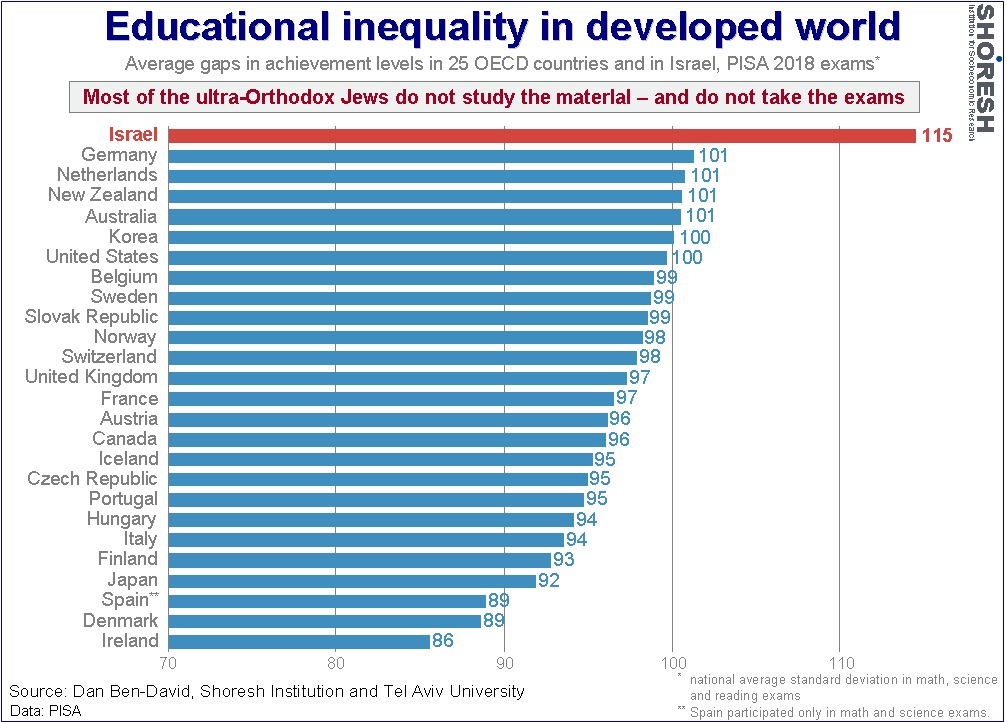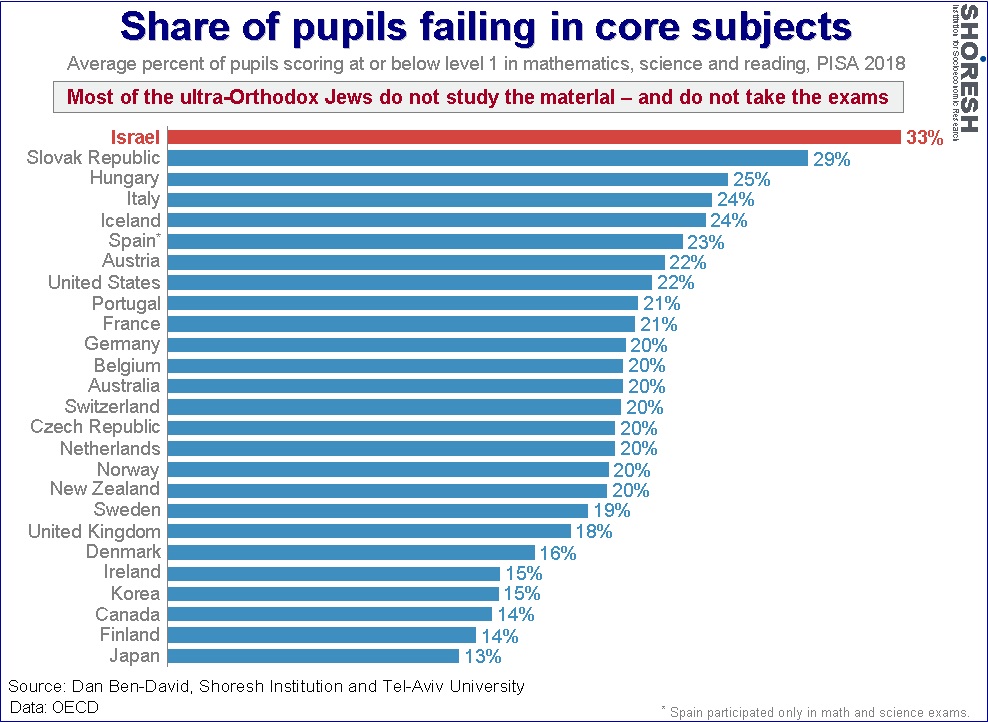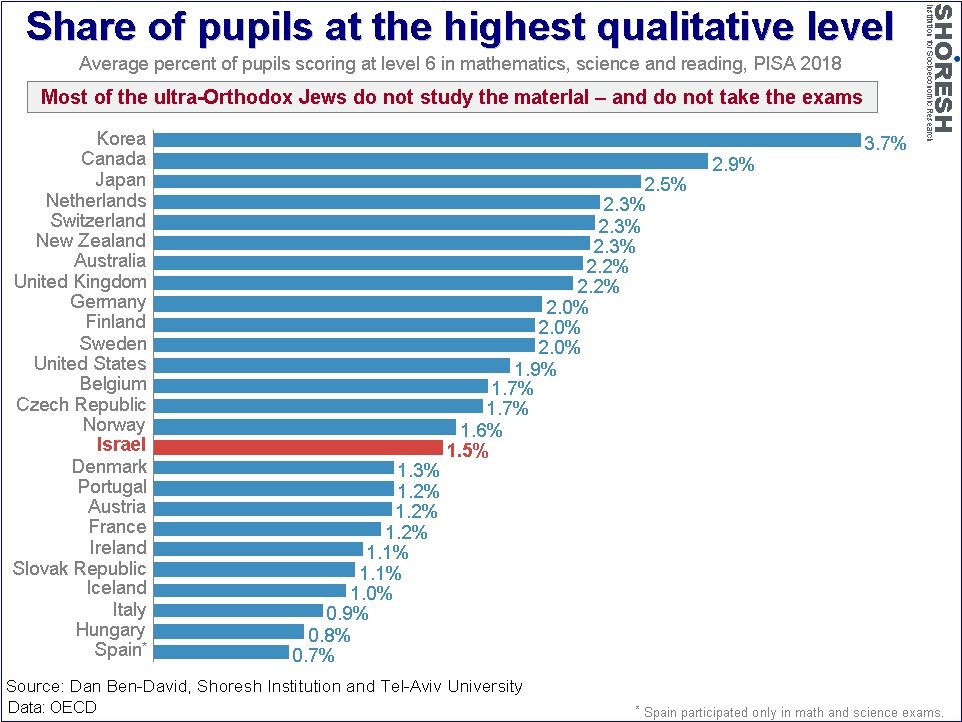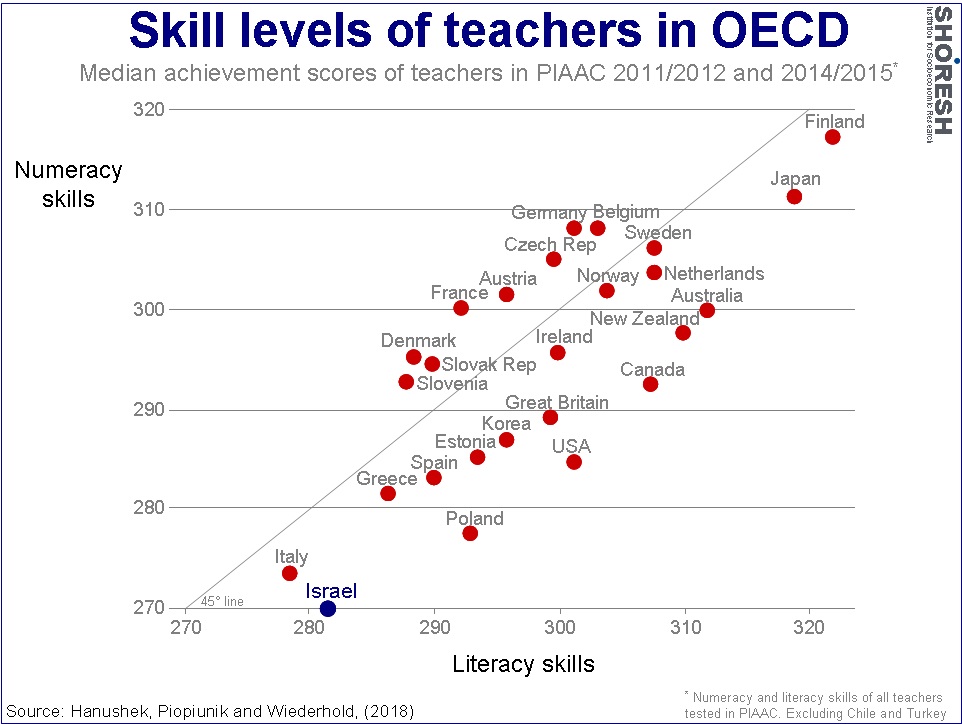|
published
in Times of Israel
on March 15, 2023. Part 4 of 5 Tackling an existential danger: Israel’s neglected
education system by Dan Ben-David With half of Israel’s children receiving a third-world education – and
belonging to the country’s fastest-growing population groups – a first-world
economy will be unsustainable, a first-world army impossible Since no country can – or wants – to
produce everything it needs by itself, all developed countries have to compete
with one another in the global and competitive marketplace. This competition
will only increase in the future, and the graph below reflects how each of the
developed countries is preparing its children for that modern labor market.

Even excluding haredi children –
most of whom do not study the required material and do not take the
international exams – the achievements of Israeli children in the core subjects
are below those of all developed countries. The average knowledge of pupils in
the state-religious system in mathematics, science and reading places them
below 80% of the developed countries. Below the non-religious and
religious Jewish schools are the country’s Arabic-speaking schools. Their pupils rank below many third world
countries. In fact, Israel’s Arabic-speaking pupils score below nine of the 10
predominantly Muslim countries that participated in the last PISA exam – the
OECD’s assessment program. This lack of
fundamental knowledge will significantly limit their future economic
opportunities. In addition to the haredi and Arab
children (each of these groups alone accounts for over a fifth of the country’s
first grade pupils), there are many children living in Israel’s geographic and
social peripheries receiving a third world education in the basic fields of
study.

The three aforementioned groups
together comprise roughly half of Israel’s children – and they belong to the
fastest-growing parts of the country’s population. As adults, they will not be
able to maintain a first world economy, only a third world one. But a third
world economy will not be able to support a first world healthcare system, or a
first world welfare system. Perhaps most importantly for a country located in
the most dangerous neighborhood on the planet, a third world economy cannot
maintain a first world army. In other words, if we don’t come to our senses in
time, Israel will not become a third world country when our grandchildren reach
our age. It just won’t be. When former president of Israel,
Reuven Rivlin, began his presidency, I showed him an earlier version of the
above pie graph. Understanding the
implications from that briefing, Rivlin and his strategic adviser, Roni Elon,
wrote his “four tribes of Israel” speech.
That graph came to symbolize the president’s plea for the four tribes to
strive for a joint future and overcome self-serving internal pressures. The current governing coalition’s frontal
attack on the fundamental underpinnings of democracy suggest just how deaf some
tribe leaders are to president Rivlin’s appeal. Not only is the average level of
core education in Israel at the bottom of the developed world, the educational
gaps between its children are also the highest – by far. And this problematic outcome was attained
without the haredi children, whose inclusion would have yielded a more
accurate, but considerably higher, level of educational inequality than is
displayed in the graph.

When these children become adults,
the disparity in the educational tools that they have been given will translate
into income disparity. In the lonely
Middle Eastern outpost that is Israel, social solidarity has been a key to its
physical survival. Huge income
inequality steadily but surely corrodes this vital shared sense of purpose and
willingness to sacrifice that is so indispensable for Israel’s continued
existence. The prime candidates to live in
poverty as adults are children who fail in school. Clearly this is not a blanket statement that
all such children are doomed to be poor.
However, the lower the jumping board into the marketplace, the more
difficult it is to jump high. A full
third of Israel’s children fail in math, science and reading – and that does
not even include the haredi children who do not even study the material or
participate in the exams. What kind of a
future is Israel preparing these children for?
What chance do the majority of them have to become a part of the startup
nation?

The failure rate in core subjects is
highly correlated with another variable that has huge implications for the
viability of democracies. The higher the
share of children in a country who fail in the basic subjects, the higher the
share of pupils unable to plan ahead or set subgoals.

In other words, countries with many
children who do not understand basic material will end up with many adults
exhibiting similar limitations. These
individuals will have a difficult enough time as it is to make ends meet in a
modern economy. But in a downturn, they
become the hardest-hit group, with little to no safety net to rely on. When a recession becomes truly
severe, these individuals look for any ray of hope that they can find, becoming
fertile ground for populists, demagogues and charlatans. In democratic countries where a large share
of individuals are unable to understand the implications or veracity of what
they are being promised, but with an identical vote to individuals who do
understand, the danger to democracies should be readily apparent. It has already reared its head in a number of
developed countries following the Great Recession that they underwent over a
decade ago. Israel, with the highest share of
children who do not understand the material, and the highest share of children
who do not understand the implications of what they are being told, is in the
most precarious position among the developed countries. As such, it should not come as a surprise
that four of the six people heading the political parties comprising Israel’s
current governing coalition have criminal records, have been arrested or are
currently on trial for corruption – and are now waging a frontal assault on
Israel’s key democratic institutions. Those children who excel in the core
subjects will disproportionately emerge as Israel’s future tech, business and
academic leaders. In Israel, these pupils
account for 1.5% of all those who took the exam, a percentage that is below
most developed countries. The actual
Israeli percentage of excelling pupils is lower than this because the
denominator in the graph does not include the haredi kids who do not study the
material and do not take the exam.

The quality of education that Israel
gives its children has had a very negative impact on large swaths of its
economy. As the country’s recent
elections have shown, it has also brought the country’s democratic institutions
to their knees. An Israel seeking a
viable future needs to gain control of its schools – all of them. Specifically, Israel needs to implement a
systemic, comprehensive and thorough reform of the country’s education
system. This education reform should be
based on three cornerstones. 1.
A significant
upgrade of the core curriculum for all Israeli children. This means raising the
overall level of study in the basic subjects in grades 1 to 12 – and making
this core curriculum uniform and compulsory in all of the schools in each of
Israel’s education streams, including all of the religious and haredi schools. ·
While there are
many different lifestyles in Israel – and it is fine that schools also teach
values consistent with the lifestyles of the parents – there is only one global
marketplace common to us and all the other countries. It is inconceivable that
we deny any Israeli child the opportunity to work and succeed in that modern
economy. A strong basic education will be good for them – and for us all. ·
Similarly with
regard for the need to introduce into the core curriculum basic democratic
principles such as civil and human rights, the need for checks and balances
between government branches, and the concept that having a majority does not
confer tyranny of the majority. Absolutely
no public funds may be given to schools that do not teach the full core
curriculum. 2.
Fundamentally
changing the way that teachers are chosen, trained and compensated needs to be
addressed. The basic knowledge level of Israeli teachers is at the bottom of
teachers in the developed world.

Therefore, instead of studying for a teaching or education degree –
as is customary today – and along the way, a bit of math, English, physics, and
so on, all individuals considering the possibility of becoming a teacher in
Israel should be required to first get accepted to academic programs in math,
English, physics, etc. and obtain a degree in those disciplines. Afterward,
they should study towards a teaching certificate. Consequently, those who go through this route do not have to become
teachers. If the State of Israel wants them as teachers, it will have to pay
them accordingly – but it will also then be able to demand that they work
accordingly, from morning to evening, every day, all year round, with work and
vacation times similar to their alternative possibilities in the workforce.
This will enable the hiring of fewer teachers, with much greater compensation
for each – while gaining a much higher level of knowledge from them to pass
along to our children. 3.
The Education
Ministry must undergo a structural transformation. It is not possible to manage
a grocery store the way the largest governmental budget is currently being
run. The ministry determines the
contents of the teaching materials, it is responsible for their implementation
in the classrooms, and it is the body that checks whether it has fulfilled what
it determined that it should do – in other words, complete conflicts of
interest. The ministry acts as if issues
such as measurement and evaluation are beyond its realm of concerns. For
example, matriculation (bagrut) exams have been administered for
decades, but it never occurred to the ministry to perform even the minimal step
of calibrating the exams from year to year and between schools throughout the
country. As a result, the Education Ministry has no idea whether the level of
knowledge of Israeli children has improved or declined over the decades, nor
how it compares across schools. School management must be transferred to the schools themselves –
combining accountability with the provision of the necessary authority to the
principals, who will be subject to a board of directors comprising individuals
from the Education Ministry, the local municipality, parents and teachers (with
a majority for the Education Ministry). The ministry will establish a formula
for the determination and distribution of budgets to the schools while the
school principals will have to present their strategic plans to their board of
directors showing how they plan to allocate their budgets to achieve the
national goals (such as core curriculum) as well as those objectives reflecting
local lifestyles (in such areas as culture, art, religion, and so on). Principals
should be given full discretion to decide who their teachers will be and their
salaries, with the school board of directors having the ability to hire and
fire principals on the basis of their accomplishments or failures. Children
must be raised with a clear understanding of the dos and don’ts of a liberal
society – regardless of their choices along the religious-secular
spectrum. Children with a firm grasp of
the basic skills will have opportunities to thrive and personally develop in a
modern economy, reducing their dependency on others. Better educated adults will also understand
the incumbent requirements of parenthood and will be more judicious in their
fertility decisions. |